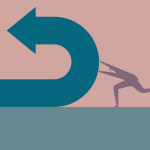“Survival is a community event”
– Tessa Miller, Author and health justice advocate
Individuals experiencing debilitating injuries and chronic illnesses present a challenge to many traditional approaches to counselling and career development that see barriers as temporary and recovery as linear. Such clients can challenge career professionals as we are reminded uncomfortably of the precarity of our health and lifestyle.
Over two years into the COVID-19 pandemic, more career professionals have likely encountered working with clients who have been affected by illness. This includes long COVID or post-COVID condition, in which people continue to experience symptoms more than 12 weeks after infection. This chronic illness can have implications for an individual’s career development and may require career professionals to explore different approaches to client support. Fortunately, there are ways to cope with uncertainty and cultivate hope and meaning with clients in spaces where traditional approaches no longer work.
The challenge of uncertainty
Author and health justice advocate Tessa Miller writes, “we’re brought up to believe sickness either goes away or kills you. But what about the space in between, where it does neither?” (2021, p.70). With chronic illnesses, we have something in between; neither as healthy and functional as they previously were, nor presumably on the path to recovery.
Operating within this space requires that we sit with our clients in the uncertainty, noting that while recovery may be possible, it may be that their present symptoms remain for their lifetime. With long COVID, we know most people’s condition does improve, but this recovery is not linear and is by no means absolute or guaranteed. Some continue to suffer years after being afflicted, and with over 200 symptoms currently attributed to the disorder, it can easily become a source of life-altering disability.
Normalizing experiences
As career professionals, it is crucial that we recognize our “biases and assumptions about people with disabilities and remember that clients with disabilities are experts in their own lives [ to…] become better positioned to understand their clients’ needs and be able to best advocate for their clients” (Jashinsky et al., 2021). I designed a short exercise to self-reflect on the impact of long COVID for a workshop delivered to career professionals, noting how symptoms can change over time.
By taking time to check our own assumptions and improving our understanding of the experiences of people living with illness, we can better understand and validate our clients’ experiences. Chronic illness is an intensely emotional experience with grief often at the forefront, as “chronically ill people grieve two versions of ourselves: the people we were before we got sick and the future, healthy versions that don’t exist” (Miller, 2021, p. 68).
“Operating within this space requires that we sit with our clients in the uncertainty …”
Beyond grief, clients may resent others who seem unaffected by the same kind of losses as well as express anger, anxiety and many other emotions. Grief researchers note that the “ability to name the experience and its unique effects that are often unacknowledged by others can provide a powerful source of strength to those who experience chronic sorrow. […] Clients who begin to understand the nature of these losses and receive validation for their loss(es) often experience relief and improved self-concept almost immediately” (Neimeyer et al , 2011, p.169).
We can further assist by helping the clients recognize that societal narratives around overcoming illness must be challenged. We can help clients balance societal narratives around overcoming adversity with having realistic goals and not associating chronic illness with personal failure (Neimeyer et al., 2011). The act of normalizing these emotional experiences, while referring clients to mental health counselling when needed, can be tremendously beneficial.
Working within uncertainty
The experience of working with uncertainty presents an opportunity to develop flexible goals around the concept of marginal gains. In their work with those experiencing chronic pain, Mintle and Kribs (2019) draw an analogy to the Tour de France and the repeated victories of England’s Team Sky, owing to their practice of pursuing marginal gains. Team Sky searched for improvement in every possible component of the race, from the weight of the bike pedals to the bedroom paint colour to maximize sleep. Though each offered only marginal gains, collectively they dramatically improved the team.
When working with clients experiencing chronic illness and pain, clients can explore how they can find a 1% improvement in one or more components of their life, from social to career to nutrition. This fosters a sense of achievement and personal agency and pushes back against the black-and-white thinking of either being completely healthy or ill.
Referral and advocacy
Living with long COVID and many other forms of chronic illnesses can be tremendously difficult. As career professionals, it is essential that we encourage clients to use all medical and societal supports available as well as advocate for greater access to them. Miller argues that we should go beyond empathy, asking, “What good is putting yourself in someone else’s shoes if you’re going to stand immobile in them, instead of figuring out how to run?” (2021, p.232). Medical professionals, mental health counsellors, community services and support groups all play an essential role in helping clients with chronic illness maximize function and manage the challenges of living with life-altering uncertainty.
We also must advocate to ensure clients have effective information on making insurance claims and do not fall through the cracks, as claims for long COVID are being challenged. Helpful career resources and timely referrals can improve client outcomes and ensure that we all play a role in creating a more just and equitable society, regardless of health.
Further readings and resources:
- Collection of journal articles on Long Covid and Mental Health – Pub Med
- Jashinsky, T. L., King, C. L., Kwiat, N. M., Henry, B. L., & Lockett‐Glover, A. (2021). Disability and COVID‐ 19: Impact on Workers, Intersectionality With Race, and Inclusion Strategies. The Career Development Quarterly, 69(4), 313–325. https://doi.org/10.1002/cdq.12276
- Miller, T. (2021). What Doesn’t Kill You: A Life with Chronic Illness-lessons from a Body in Revolt. Henry Holt and Company.
- Mintle, L. S. P., & Kribs, J. W. D. (2019). Living Beyond Pain: A Holistic Approach to Manage Pain and Get Your Life Back. Baker Books
- Neimeyer, R. A., Harris, D. L., Winokuer, H. R., & Thornton, G. F. (2011). Grief and bereavement in contemporary society: Bridging research and practice. Routledge.







